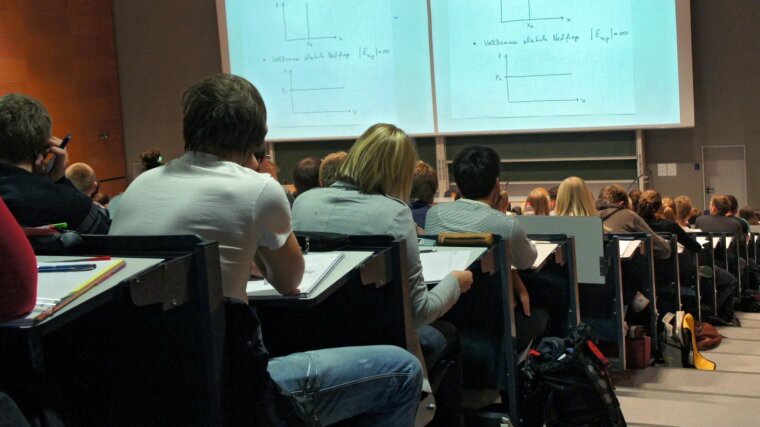
The bachelor's degree program in materials science is characterized by great versatility and teaches a wide range of content from the natural sciences and engineering in a duration of six semesters. The curriculum includes content from the natural sciences such as mathematics, chemistry, physics and computer science as well as from engineering, in particular materials-oriented design and materials-specific topics such as metals, glass, ceramics and polymers. In addition, fundamentals of machine learning are taught to give students an insight into current developments and technologies.
In addition to this technical content, students are also taught basic skills that are essential for a successful career in this field. These include skills in scientific English, scientific research, communication and presentation. The lecture content is taught in a practical manner through numerous laboratory practicals, allowing students to put their knowledge directly into practice. An optional 10-week industrial internship also offers insights into non-university activities.
Under the university's research profile "Light, Life, Liberty", in addition to traditional content, particular importance is attached in Jena to the materials glass and glass ceramics, linear and nonlinear optics (laser-assisted manufacturing and materials processing, glass fibers), medical technology (metallic, ceramic and polymer-based implants), materials for energy and environmental technology (batteries) and biomaterials (bioactive glasses and biomimetic materials).
The broad spectrum of courses at the interfaculty Otto Schott Institute for Materials Research is additionally extended by cooperations with the Technical University of IlmenauExternal link and the Ernst Abbe University of Applied SciencesExternal link in Jena.
Furthermore to be emphasized are:
- excellent supervision and close contact between teachers and students (StudyCheckExternal link)
- demand-oriented support during studies through tutorials, study groups and seminars
- close networking with non-university research institutions, the University Hospital Jena and industry
- active and committed student councilExternal link with regular events for students (excursions, sports events, regulars' table)
- a wide range of services offered by the Studierendenwerk ThüringenExternal link (apartments, dining halls, BAföG advice, childcare)
- an attractive student city in the green Saale valley ("Happy -Jena EditionExternal link") with short distances and numerous sporting and culturalExternal link offerings
Career prospects
After graduating in materials science, you can expect tasks in the field of development of new materials and products, manufacturing and quality assurance and assessment of damage cases at national and international research institutes such as Max-Planck, Leibniz, Helmholtz and Fraunhofer resp. NASA, ESA etc. and in all branches of industry (vehicle construction (automotive), aerospace, mechanical engineering, metal processing industry, chemical industry, energy and environmental technology, electrical industry, optical industry, glass and ceramics industry, medical technology, mining and metallurgy, building materials industry, paper industry, ...).
Content and structure
The bachelor's degree program in materials science offers a broad and diverse education. In addition to basic science and engineering subjects such as mathematics, experimental physics, chemistry, computer science, statistics and machine learning, fundamentals of materials science, crystallography, and manufacturing technology, specific lectures on all major classes of materials (metals, polymers, ceramics, and glass) are also offered. In addition, skills in scientific English, communication, and presentation are taught.
For students interested in specific topics, there is a wide range of modern electives such as biomaterials, alloys, nanomaterials, or materials for energy and environmental engineering. The lecture content is illustrated by laboratory practicals and an optional 10-week industrial internship offers an insight into non-university activities. This allows students to experience the practical application of what they have learned and improves their career opportunities after graduation.
Downloads
-
-
Faltblatt_BSc_WeWi_2023 de
- File type:
- File size:
- 2 mb
- Modification date:
-
Modulkatalog_BSc de
- File type:
- File size:
- 625 kb
- Modification date:
-
Musterstudienplan_BSc de
- File type:
- File size:
- 52 kb
- Modification date:
-
Prüfungsordnung_BSc_Werkstoffwissenschaft de
- File type:
- File size:
- 294 kb
- Modification date:
-
Studienordnung_BSc_Werkstoffwissenschaft de
- File type:
- File size:
- 234 kb
- Modification date:
-
Vorgehensweise_Betriebspraktikum de
- File type:
- File size:
- 28 kb
- Modification date:
-
Faltblatt_BSc_WeWi_2023 de
Helpful links
- Examination regulations BSc Material ScienceExternal linkde
- Study regulations BSc Material ScienceExternal linkde
- PAF - Office for student affairs and examinations - Generel Informations
- PAF - Office for student affairs and examinations - Modules & Content
- Friedolin of the FSUExternal link
- MoodleExternal link
- Studienrendenwerk ThüringenExternal link
- Career Point
- International Office
- Writing Center of the FSU de